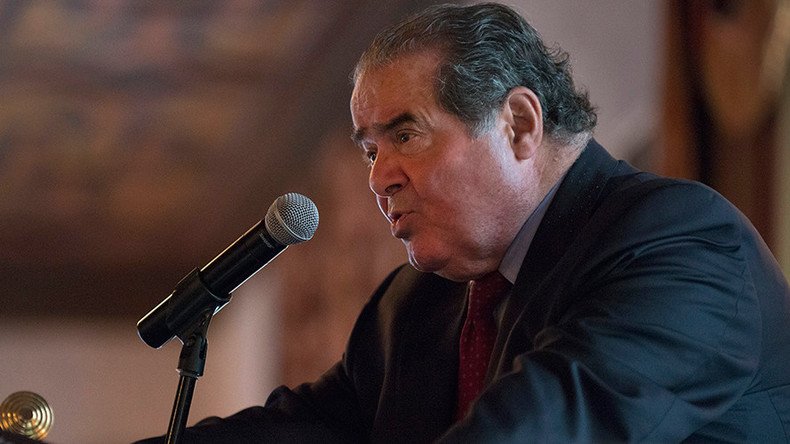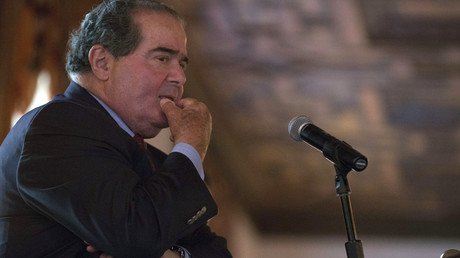Remembering Judge Antonin Scalia, America's juridical rock star

Associate Supreme Court Justice Antonin Scalia died suddenly Saturday at the age of 79. He was loathed, loved, reviled and revered – depending on with whom you were speaking. And depending in particular on their politics and worldview.
Both respected and demonized, mostly by a global audience who for the most part never read a single word of any opinion in his considerable three-decade tenure, Antonin Gregory Scalia was a veritable juridical rock star, lightning rod and a walking Rorschach Test as he was susceptible to any interpretation depending on the frame of reference of the observer.
Antonin Scalia left a legacy of controversial comments: Here are 9 of his best...or worst https://t.co/sRvvDlWzEWpic.twitter.com/xUcdlpExht
— RT (@RT_com) February 14, 2016
In other words, people saw him as what they wanted and what they wished him to be. He was either a conservative archangel spreading the good word in a God-forsaken landscape, or a Cerberus, guarding the gates of conservative Hell from the onslaught of those who wished to destroy his Constitutional distortions and prevent the systematic ruination of our system of justice. He was that divisive and, frankly, that great.
Mr. Justice Scalia was a truly brilliant jurist who never suffered fools gladly, as St. Paul coined. And how apt a reference in that Scalia and his wife were ardent and devout Catholics, with his siring nine children during their marriage, utilizing as he was wont to joke “Vatican Roulette.” In fact, it was long suspected (though never officially proved) primarily by his legions of detractors that he was even a member of the mysterious Opus Dei, a cadre of devout Catholics, conjuring up an almost Da Vinci Code imagery, which it was suspected was the key, they submit, to understanding his rabid homophobia and fervent anti-abortion stance. Again, all depending upon the jaundiced eye of the beholder.
Of the 112 justices who have served the Supreme Court of the United States (SCOTUS), few if any have enjoyed the profoundly controversial status that Nino (to his friends) attracted, generated and craved. His was the unabashed conservative titan, loved and adored by scores of rock-ribbed Reaganistas and right-wing stalwarts and a favorite of the Federalist Society, a self-described “group of conservatives and libertarians interested in the current state of the legal order.”
What Scalia was most noted for was how he championed an originalist methodology of statutory and case construction, defined in effect as interpreting the Constitution’s meaning and intention as fixed as of the time of its enactment. Just let that marinate for a moment. Twenty-first century interpretation via the prism of an 18th century worldview. As the saying now goes, “What could go wrong?”
Let’s look at this originalist construction methodology closer. The famed and cherished Bill of Rights, enacted in 1791, references the first ten amendments to the Constitution and addresses a host of personal liberties and protections that are familiar to most, such as freedom of speech and press, the right against illegal search and seizure and the prohibition against cruel and unusual punishment. Now, according to Mr. Scalia, those protections, listed often in rather stilted and hard to decipher language, should be interpreted in a way that is consistent with how our Constitutional forebears wrote and thought then.
Now, think about it. The Bill of Rights was drafted in a time when slavery was the norm and before its ultimate abolition by the Thirteenth Amendment in 1865 after the Civil War. What Scalia suggested was to use the mindset in essence of the Constitution as crafted by drafters in a country and at a time when human beings were legally bought and sold like chattel.
In fact, the Thirteenth Amendment in effect repealed the Fugitive Slave Clause, which was contained in the original version of the Constitution and stated (and take particular note of the language style): No person held to service or labor in one state, under the laws thereof, escaping into another, shall, in consequence of any law or regulation therein, be discharged from such service or labor, but shall be delivered up on claim of the party to whom such service or labor may be due.
And that from the country that brought you “All men are created equal.” Well, at least for some.
Now, to the uninitiated and unfamiliar, simply put, Antonin Scalia drove liberals and progressives nuts. And you might see why. His formal legal writings, whether in majority opinion or dissents, were often peppered with stinging sarcasm and pointed ridicule – aimed and directed to fellow Justices in many cases – in a manner rarely if ever seen in the rather dry and official style of legal writing.
Nino was brutal, heartless and brilliantly funny. And, please do not think for a second that I am of the opinion that his legal reasoning was wanting or invalid. On the contrary, throughout his countless opinions he was more often than not spot on and on target. But that begs the question, his opinions were correct if you agreed with them. It was not a rarity for him to use sound legal reasoning in coming to a decision you didn’t care for.
Of the countless examples of Scalia’s biting wit and stinging rebukes, here are two that are most illustrative of the man.
June 2015, dissent in Obergefell v. Hodges (The decision that legalized same-sex marriage nationwide in which Scalia disagreed).
The totally unexpected loss of Supreme Court Justice Antonin Scalia is a massive setback for the Conservative movement and our COUNTRY!
— Donald J. Trump (@realDonaldTrump) February 13, 2016
“When the Fourteenth Amendment was ratified in 1868, every State limited marriage to one man and one woman, and no one doubted the constitutionality of doing so… Since there is no doubt whatever that the People never decided to prohibit the limitation of marriage to opposite-sex couples, the public debate over same-sex marriage must be allowed to continue. But the Court ends this debate, in an opinion lacking even a thin veneer of law.”
May 2011, California Lawyer magazine interview:
"Certainly the Constitution does not require discrimination on the basis of sex. The only issue is whether it prohibits it. It doesn't. Nobody ever thought that that's what it meant. Nobody ever voted for that. If the current society wants to outlaw discrimination by sex, hey we have things called legislatures, and they enact things called laws. You don't need a constitution to keep things up-to-date. All you need is a legislature and a ballot box. You don't like the death penalty anymore, that's fine. You want a right to abortion? There's nothing in the Constitution about that. But that doesn't mean you cannot prohibit it. Persuade your fellow citizens it's a good idea and pass a law. That's what democracy is all about. It's not about nine superannuated judges who have been there too long, imposing these demands on society."
To those unfamiliar with the whole notion of originalism and statutory construction and fancy-schmancy legal terms, Antonin Scalia represented a number of things.
First, he knew exactly where he was going to end up on a case and then bootstrapped his thinking in a brilliant post hoc analysis that gave the impression that his ultimate finding wasn’t the result of personal bias or preference or even animus but rather the cold and methodical application of a juridically clinical interpretation matrix called originalism.
Justice Scalia was a defender of the constitution, an important conservative voice in the court. He will be missed. https://t.co/cOB3juvx7A
— Dr. Rand Paul (@RandPaul) February 13, 2016
Next, he gave life to the SCOTUS bench. More people knew who he was than many of the more popular pols and officials. He was a triple threat: brilliant, affable and camera-ready. No one on the bench could carry his gavel. His colleagues and contemporaries, with the exception of Elena Kagan IMHO (as the kids say), the newest and latest addition, were no match for El Nino, the judicial tempest.
And finally, Scalia’s death has just made the 2016 election go even more nuclear, if that’s even possible. As the Constitution directs, the President replaces a SCOTUS seat through a nomination with the advice and consent of the Senate.
Senate Majority Leader Mitch McConnell said that Scalia should not be replaced until after the presidential election. That’s a rather novel approach. Because McConnell sets the Senate’s schedule as Leader, his remarks seem to signal the GOP's intent to not confirm any nominee offered by President Obama. Translation: deadlock, foot-dragging and stalemate. “The American people should have a voice in the selection of their next Supreme Court Justice," he said in a statement. "Therefore, this vacancy should not be filled until we have a new President.”
So, even in death, Nino’s still inspiring controversy.
The statements, views and opinions expressed in this column are solely those of the author and do not necessarily represent those of RT.














